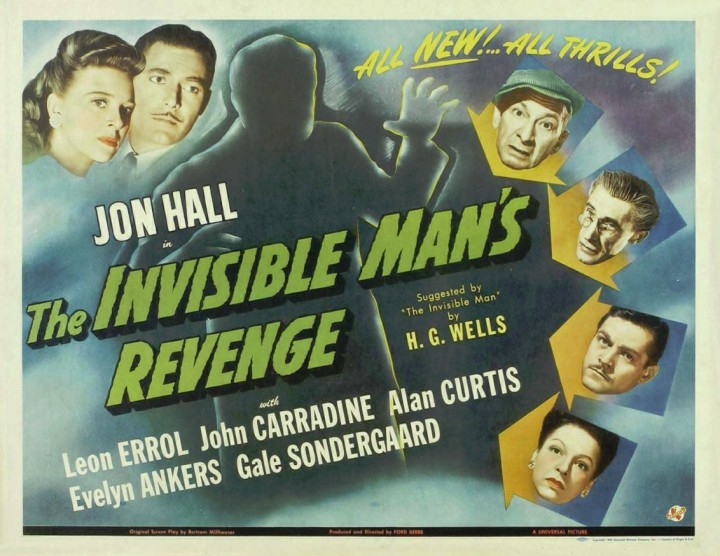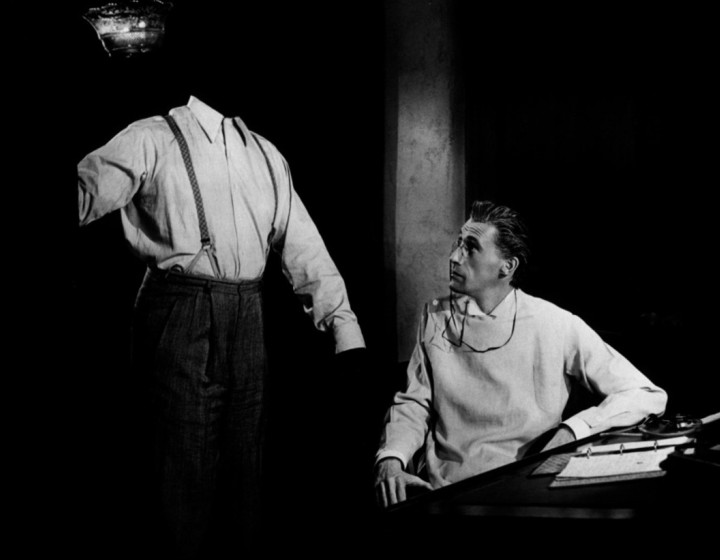The more sober screenplay, solid direction by Beebe, and the good cast helped make The Invisible Man’s Revenge possibly the best entry since the original film. Jon Hall was cast against type as a mentally unbalanced fellow with an arguably justifiable chip on his shoulder. His former associates did leave him for dead in the jungle and did avail themselves of a fortune in which he had a rightful share and do drug him and send him packing when he tries to make a claim on them. It is the sort of behavior that’s apt to try a person’s patience, but then we already that this Griffin (Rob by name) had issues, since he murdered a couple folks getting out of an insane asylum in Africa. Then again, it seems unlikely that stowing away in a bail of cotton from South Africa to England did much to improve his mood — and we all know that peevishness and barking lunacy are a dangerous mix.
Here, as noted, the invisibility is the result of the assistance of crazy scientist John Carradine, who sells our boy on the benefits of invisibility as a means of getting back at those who have wronged you — after all it worked for Carradine’s invisible dog. Of course, Carradine is mystifyingly surprised when his human guinea pig isn’t content to be a scientific marvel, but sets off to get what’s rightfully his in his new transparent form. The doc apparently didn’t think this through, but neither has our see-through madman, since he hasn’t considered how being invisible might put a crimp in his plans for romancing his tormentors daughter (the inevitable Evelyn Ankers). But where there’s an insane will — and a clever screenwriter — there’s a way. No, it’s not a patch on the James Whale film, but it has its points as one of Universal’s “silver age” (oft times, more like tin-foil age) outings.






Delighted to see your kind words for Ford Beebe. He was responsible for my three favorite Uni horrors of the 40’s: this one, NIGHT MONSTER & SON OF DRACULA. Granted, he didn’t direct SOD, but I’ll bet the house he was in charge of the coffin rising from the water & the chase scene in the woods. I’d guess he might also have been instrumental in coming up with the transformation scenes as his son was working for Disney at the time.
Beebe gets a bum rap — maybe because he made serials and would apparently take just about any job. When he’s good, he’s pretty darn good.
Probably couldn’t be worse than The Invisible Man Returns.
It’s a lot less…uh…tepid than that. It’s also less silly than Invisible Agent.
The screenplay is a bit clumsy but on the whole I felt that was the worst to be said about it. The supporting players stole the show, but I count that as a strength when the star spends a bulk of his time invisible. It’s no Whale original but not shabby for a sequel that showed up a decade later.
When your star is Jon Hall, it makes it easy for folks like Gale Sondergaard (who just disappears from the film), Lester Matthews, and Leon Errol steal the show. But you’re right, for “silver age” Universal, it ain’t bad.
Only from Jon Hall could Lester Matthews steal a movie.
And Ford Beebe, on the basis of NIGHT MONSTER alone has been seriously underrated. Universal would have done better to let him handle more of their 1940s horrors.
Oh, I like Matthews okay in WEREWOLF OF LONDON and he manages to get through THE RAVEN.
The list of New Universal horrors that I genuinely like is pretty small — NIGHT MONSTER, STRANGE CASE OF DR. RX, MAN MADE MONSTER, SON OF DRACULA, and to some extent GOATS OF FRANKENSTEIN. Otherwise, it’s pretty much nostalgia or individual moments. Of course, you’re talking to someone who’ll watch all the Inner Sanctums except for STRANGE CONFESSION.
In both WEREWOLF and RAVEN I can’t help thinking the heroine makes the wrong choice even though the alternative is someone who’s clearly psychotic or someone who’s compelled to kill the one he loves most. Matthews is to Universal sort of what George Brent was to Warner Bros. But less interesting.
We part company on this. Anyway, in a sane world Matthews would have ended up with Lugosi and that insufferable tease of a heroine would have ended up in the room “where de walls come together.”